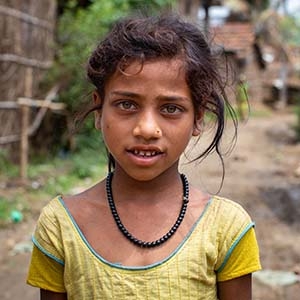1.2 Billion Children Worldwide Are Living in Poverty
No child deserves to grow up in poverty. And yet, today the number of children living below the national poverty line in low- and middle-income countries is unprecedented.
Hundreds of millions of children remain multidimensionally poor — meaning they lack access to health care, education, proper nutrition, or adequate housing — often a reflection of inequitable investments by governments in social services.
The economic fallout of the COVID-19 pandemic has resulted in a 15% increase in household poverty around the world. And for families living in countries already affected by conflict and violence, the impact of the pandemic will only cause them to fall even deeper into poverty.
Your support today can help empower children around the world who are growing up in poverty.
What Is Child Poverty?
Child poverty is more than the lack of monetary means.
Children experience poverty as the lack of food, shelter, education, water or health services.
The lack of these basic needs often results in deficits that cannot easily be overcome later in life.
Living without any of these basic social services can leave a child unable to enjoy their rights and reach their full potential.
Too often, children living in poverty lack protection from abuse, and get little support to recover from harm.
There are not only more children experiencing poverty than before, the poorest children are getting poorer as well.

Facts About Global Child Poverty
- As many as 1 in 2 children live in extreme poverty.
- A child born into a poor family today will take from 4 to 5 generations to reach the average national level of income.1
- The number of children living in multidimensional poverty has soared to approximately 1.2 billion due to the COVID-19 pandemic.2
- Globally, every region is set to experience an increase in child monetary poverty levels. However, the largest increases will be seen in South Asia and sub-Saharan Africa.
The Impact of COVID-19 on Global Child Poverty
The unprecedented global economic shock brought about by COVID-19 could set back more than a decade of progress in reducing child poverty.
COVID-19’s most lasting legacy may be an unprecedented increase in the number of children that experience multidimensional poverty, both now and for generations to come.
In response to a survey, more than75% of households reported an income loss since the beginning of the pandemic.
82% of poorer households reported a loss in income.
An additional 150 million children have been plunged into poverty since the pandemic began.
Almost 10 million children will not return to school following the
pandemic, due being pushed into poverty because of COVID-19.
Around 100 million people globally have been pushed into extreme poverty due to healthcare costs.
Ways to Help Fight Poverty in the World
Every child deserves to grow up healthly, educated and protected from harm. But far too many of the world’s children are being robbed of their childhoods and their futures because they’re living in poverty.
Children living in poverty face a higher risk of death before age 5, malnutrition that stunts their growth, being out of school, being forced into child labor or early marriage, and giving birth while they are still children themselves.
For more than 100 years, Save the Children has been on the ground working to give every child the best possible start in life. Your support today can help provide children in the U.S. and around the world the gift of a brighter future — a future free from poverty.

